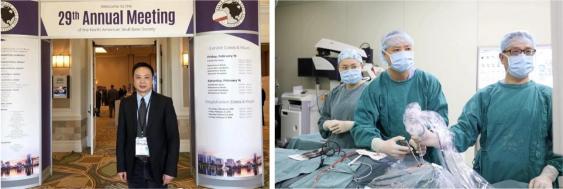The Department of Neurosurgery at First Affiliated Hospital of Chongqing Medical University was established in 1958 by Professor ZHU Zhenqing, one of the founding pioneers of neurosurgery in China. He introduced the specialty from Huashan Hospital in Shanghai to Chongqing. Over the past six decades, through the relentless dedication of multiple generations of medical professionals, the department has achieved internationally advanced and nationally leading standards. For the past six consecutive years, it has been nominated in the Fudan Specialty Rankings among the top neurosurgery departments in China, ranking second in Southwest China and first in Chongqing. The department has emerged as the foremost neurosurgical center in the upper Yangtze River region. Under the visionary leadership of the hospital’s administration, the department is steadfastly striving to build a world-class neurosurgery center with Chinese characteristics.
The department is a National Clinical Key Specialty, one of China’s first neurosurgery specialist training bases, and hosts the Academician Expert Workstation, ZHOU Liangfu Academician Workstation. It is also a key discipline in Chongqing, a medical key discipline in Chongqing, and home to the Chongqing Neurosurgery Diagnosis and Treatment Center and Chongqing Neurosurgery Medical Quality Control Center. The department is a member of the National Stroke Screening and Prevention Demonstration Base, a member unit of the National Clinical Research Network for Neurological Diseases, and the China Neurosurgery Alliance. Additionally, it is a sub-center of the National Geriatric Disease Clinical Medical Center’s Spine Minimally Invasive Alliance, the training base for the Spine and Spinal Cord Surgery of the Chinese Medical Association’s Neurosurgery Branch, a training base for the Chinese Medical Association’s Endoscopic Neurosurgery Physicians, and a training center for Microsurgery Skills of the Chinese Medical Association. The department boasts an outstanding academic presence, with 16 members serving in national academic organizations, ranking among the most distinguished in Chongqing. Key leadership roles held by department members include the chair of the Chongqing Medical Association Neurosurgery Branch (YANG Gang), the President of the Chongqing Medical Association Neurosurgery Physician Branch (SUN Xiaochuan), the chair of the Chongqing Anti-Cancer Association Neuro-Oncology Committee (YANG Gang), and leaders of 8 subspecialty groups within the Chongqing Neurosurgery Committee.
With 155 beds across two hospital campuses (Main Campus and the Jinshan Campus), including 25 dedicated neurosurgery intensive care unit (ICU) beds, the department provides world-class patient care. It is home to a highly qualified medical team, comprising 45 physicians, all holding doctoral degrees. Many younger physicians also have postdoctoral experience, and the team includes 3 doctoral supervisors and 19 master supervisors. The department is structured into six key subspecialties with 13 specialized medical teams: neuro-oncology, cerebrovascular disease, functional neurological disorders, spinal cord and spinal diseases, traumatic brain injury, and neurocritical care. Each medical team is led by senior professors and staffed by associate professors and attending physicians, ensuring highly specialized and targeted treatments. Noteworthy technologies developed by the department include the world-first “In Situ Bone Flap” technique, pioneered by YANG Gang, which was included in national guidelines, won first place in a National Health Commission competition, and is now widely adopted across China and beyond. The Pituitary Tumor Day Surgery is routinely performed, allowing for same-day or next-day discharge. Professor SUN Xiaochuan’s team has pioneered an integrated Microsurgery + Interventional Treatment for Cerebrovascular Diseases. Professor ZHONG Dong’s team has developed a Dual-Scope Minimally Invasive Neurosurgery System. Professor XIE Yanfeng’s team focuses on surgical treatments for refractory epilepsy, while Professor HUO Gang’s team provides comprehensive therapies for brain gliomas. Professor YAN Yi’s team specializes in minimally invasive techniques for spinal and spinal cord diseases. Professor WANG Xiaoshu’s team has developed a saddle diaphragm suturing (repair) technique for pituitary surgeries, and Professor CHENG Chongjie’s team is renowned for their microsurgical treatment of peripheral nerve diseases. These advanced technologies and treatment models are widely recognized across the country for their innovation and success in improving patient outcomes.
The department’s nursing team of 94 professionals includes 15 specialized neurosurgery nurses, 7 PICC-certified nurses, 2 ventilator therapists, and 1 wound and ostomy care specialist. The department has received multiple prestigious accolades, including the “Exemplary Nursing Service Ward” (2020, awarded by Chongqing Health Bureau), and three consecutive years (2013, 2014, and 2015) as “Exemplary Nursing Service Ward” within the hospital, third place in the 2019 “Beautiful Ward” competition. Approved as a Chongqing Neurosurgery Nursing Training Base (2020), it has successfully trained nurses from Sichuan, Hubei, Guizhou, and Chongqing. In 2023, the team received the “Patient Satisfaction Award”, “Excellence in Nursing Quality Award”, and “Third Prize in Nursing Internship Teaching”.

Director YANG Gang’s pioneering “In Situ Bone Flap” technique, which is the world’s first of its kind, has been incorporated into clinical treatment guidelines.
Committed to bridging the gap between basic and clinical research, achieving breakthroughs to provide more advanced treatment options for neurosurgical patients, the department has led 125 national and regional research projects, including sub-projects under the National Science and Technology Support Program and National Natural Science Foundation projects. It has published over 600 research papers and received numerous prestigious awards, including one First Prize for Technological Advancement (Provincial & Ministerial Level), two Second Prizes for Technological Advancement (Provincial & Ministerial Level), two Third Prizes for Technological Advancement (Provincial & Ministerial Level), and three First Prizes for Medical Technology Achievements (Bureau Level). The department has also filed four National Invention Patents. Additionally, it has actively contributed to the development of national clinical guidelines and expert consensus papers. Research findings have been published in top international journals such as Stroke, Advanced Functional Materials, Nano Research, Molecular Psychiatry, Brain, and Nucleic Acids Research.




